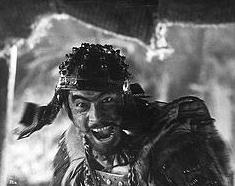
|
|
|
カテゴリ:みるもん
Akira Kurosawa's "Seven Samurai " begins with a stark credit sequence: muted white letters on a velvety black background, scored by ominous koto drums. It is the last time this film, so much more complex than your average samurai flick, does anything in pure black and white. Seven Samurai is an epic tale of seven heroes that stand up to fight for a town of farmers under threat of attack from 40 bandits. These bandits come through on a yearly basis, taking the crops (rice) and killing those who would resist them. With the harvest season coming soon, some of the elder members of the village have decided that enough is enough, and wander to a far off city in a quest to find samurai. The rumor has been that a group of samurai helped a village survive some years ago, and that if the village could find a way to pay these men, they too could be saved by the swordsmen. The thing working against them though, is that they do not have much to offer, and without the upcoming crops, they are going to starve. So they give up eating healthy in order to use their current rice as an enticement to possible defenders. It's not a successful quest at first, but as luck would have it, the journeying party comes across a man who takes pity on the farmers. He is of high moral standards, and carries himself in a very distinguished way. With early scenes that he has, you can see immediately that this is someone of strong character, who could really do a huge service for this village. Though the going is very difficult, he takes on the task of putting a team of samurai together in order to go back and defend the village from the impending attack of the bandits. Among them is a friend from the past, a kid just learning how to use his sword, and several other highly developed characters that each has their own unique attributes within the story. They put together quite a good group of seven samurai, and head back to defend a village for no other reason than to do what is right...  【Akira Kurosawa】Seven Samurai【Toshiro Mifune】 Perhaps the most important theme developed in The Seven Samurai is one that echoes through Kurosawa's entire oeuvre. Kurosawa was the most westernized of Japanese directors of his generation and became increasingly so over the course of his career, much to the consternation of Japanese film critics and, to some extent, audiences. In his early films, Kurosawa pretty much adhered to the relatively rigid Japanese precepts of culture that view the individual as a cog in the machinery of the society. Kurosawa's later films increasingly emphasized the more flexible humanism and emphasis on individuality characteristic of western culture. The Seven Samurai stands at the threshold of Kurosawa's gradual shift in view. We are shown, in this film, mainly the detrimental consequences of the strong Japanese insistence of acting on social obligations. The farmers rigidly adhere to cowardly unwillingness to fight, the bandits can't abandon their raid on the village when they find it well defended, and even the samurai can do nothing other than fight and die for honor. It all seems so futile in the end. We are also shown the stubborn persistence of caste divisions, even when the samurai and farmers must join together in defense of the community. The romance between the young samurai and the village girl is still scandalous and Kikuchiyo must shamefully hide his heritage as the son of a farmer. Only Kambei, who symbolizes reason and wisdom, is able to bridge the gap between the castes to any extent. In the middle segment of the film, the farmers and the samurai gain mutual respect as they become more acquainted with one another. In the end, however, the villagers go about their business in disregard to the warriors who saved their village and their lives. They prove as deceitful and selfish, in their own way, as the bandits. Even among the samurai, we gain a sense of the fragility of their bond. They come together in temporary alliances that form based on battles lines but the bonds are broken by either death, victory, or defeat. In the end, the transience of human ties is linked to life and death itself. The bonds that each person forms are dictated by the chance of when and where he or she was born and who happens to be there concurrently. Then we die alone. The Seven Samurai offers a complex message of human honor, decency, striving, and endurance, along with a sense of futility and the ultimate emptiness of glory. It may not quite qualify as a theme, but it is also worth observing the Kurosawa's film work is mainly male cinema. His are rooster-flicks, not chick-flicks. Women in Kurosawa films are mostly abominations; either uncontrollably sexual or pathologically vicious..... There are few if any wasted shots to fill time. There is no useless subplot and no fluff. Each scene builds either on the plot or on the characters depth. There are no "hit " songs of the day, a trait of modern films which generally makes such modern films little more than glorified music videos or TV commercials. If you enjoy action films and can tolerate reading Japanese sub titles you need to see this film. If you are a film fan and enjoy the art of film making you need to own this film. All other films can be measured by the quality of this masterwork. What a pity modern film makers seem to rely more on technology and star power rather than the use of artful camera and direction work. Akira Kurosawa-There is no Equal お気に入りの記事を「いいね!」で応援しよう
Last updated
Apr 21, 2007 07:25:32 PM
コメント(0) | コメントを書く
[みるもん] カテゴリの最新記事
|